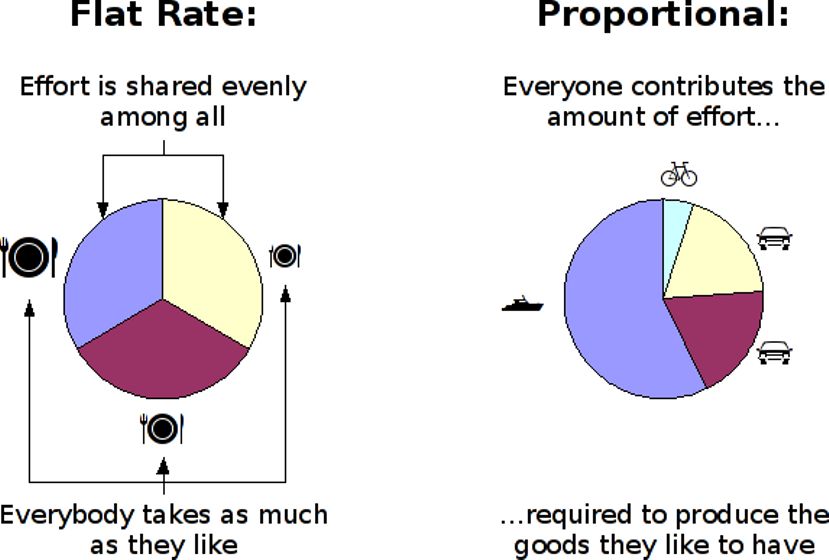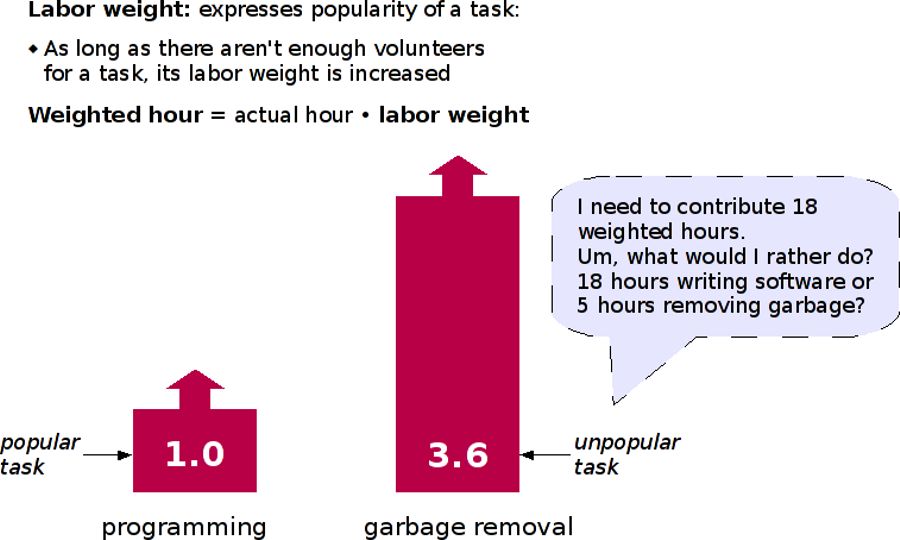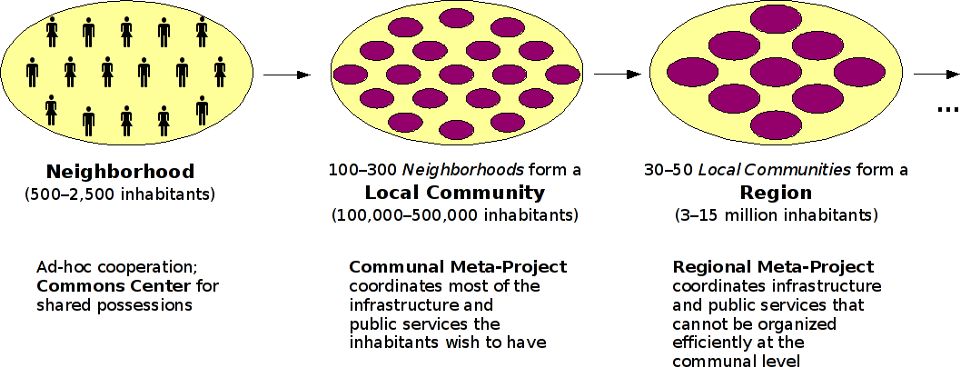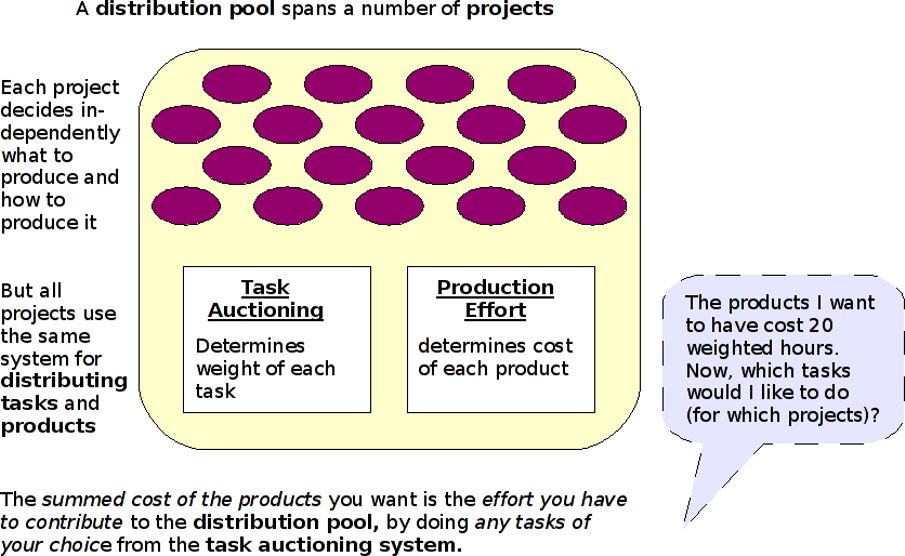Thoughts About a Society Based on Commons and Peer Production - And How to Get There
Christian Siefkes - March 2009
Commons-based Production in the Past
- In many times and in many areas, production was organized around a pool of commons.
- Open Field System: European agriculture during the Middle Ages.
- Water, air, forests and land have traditionally been "in the commons."
- Commons are managed and used by people, but they can't be private property in the usual (modern) sense of the word.
- Garrett Hardin got it wrong: commons were not "anything goes" areas, they were governed by community-defined rules.
- The true "Tragedy of the Commons" was the enclosure of the commons: The commons did not collapse, they were "stolen."
Commons-based Peer Production Today

Traits of Peer Production
(1) Peer production is based on contributions (not on exchange). Peer projects have a common goal and every participant contributes to this goal in some way or other.
People contribute to a project because they want it to succeed, not because they need or want to make money - it's use value, not exchange value, that motivates them.
The effort required to reach the common goal is shared among those who care enough to contribute ("effort sharing").
Traits of Peer Production
(2) Peer production is based on free cooperation (not on coercion or command). There are structures, but no command hierarchies: Nobody can order others to do something, and nobody is forced to obey others.
Structures can and will adapt: If participants of a project are unhappy about some aspects of the project they can try to convince the others to change them. If that fails, they can still fork the project: they can break away from the others and do their own thing.
Traits of Peer Production
(3) Peer production is based on commons and possession (not on property). Commons such as free software and open knowledge play an important role as input or output (or both) of peer projects.
Where things are not commons, they matter as possession (something that can be used), not as property (something that can be sold).
The Future of Commons-based Production
- If the renaissance of commons-based production continues, what might be the result? How might a society based on commons and peer production look like?
- What can we learn from the past and present?
- Commons need communities.
- Communities make their own rules to protect and strengthen the commons.
- A commons-based society will be based on communities which develop their own rules for creating, maintaining, and handling the commons they create and use.
- Production will be organized around a pool of commons created and maintained by these communities.
Typical Principles of Such a Society?
(1) Everyone can give as they like.
- People self-select to do things which they consider important or which they like to do.
- Often, the things which people like to do most are also the things they do best.
- This does not mean that every contribution will be accepted: others have to trust the contributor or convince themselves that their contribution is sound.
Typical Principles of Such a Society?
(2) Taking from the commons means taking something as possession, not as property.
- Possession is what I use.
- Property is something I can sell or commercialize at will.
- The apartment I've rented is in my possession, but it's the property of my landlord/-lady.
- Commons can often become possession, but never property (in the full sense of the word).
- In a commons-based society, the resources and means of production are commons. The produced goods are commons or possession.
(2) Commons can become possession, but not property
- Without property, there is no profit.
- In commons-based societies, production is motivated by other reasons than in capitalism:
- People help to produce something because they want to have it.
- They self-select themselves to do tasks which they enjoy doing.
- They support production in order to give something back to the community.
- ...
-> There are ample reasons why production takes place even where there is no profit.
Typical Principles of Such a Society?
(3) Everyone can take commons into possession, as long as they don't take them away from others.
- Just like today: everybody can freely take free software and free content without having to give anything back, since by taking them you don't take them away from others.
- Works for everything that can be copied at practically zero cost.
Typical Principles of Such a Society?
(4) If taking would mean taking away, the best way of solving this problem is to produce enough to satisfy everybody's wishes.
- If things cannot be copied freely, taking needs social agreements.
- If you and me both want to use the bicycle, who'll get it?
- It might be possible to solve such problems by arranging production so as to ensure that there are enough goods for those who want them.
- "We need to produce another bicycle."
- If there's enough for everyone interested, taking doesn't become taking away.
Typical Principles of Such a Society?
(5) The second best way is to distribute limited goods in a fair manner.
- Organizing production requires effort, and the community must find a way to distribute this effort.
- The ideal case is that effort distributes itself more or less spontaneously.
- Free software/content are based on stigmergic effort sharing: participants leave hints (signs - Greek: stigmata) motivating others to continue:
- To-do lists, bug reports, feature requests
- Wikipedia: "red links", "most wanted articles"
- Free software/content are based on stigmergic effort sharing: participants leave hints (signs - Greek: stigmata) motivating others to continue:
- Otherwise, more explicit agreements and procedures are needed.
- BitTorrent: the more bandwidth you provide for upload (allowing others to get the files they want), the more bandwidth you'll get for download (allowing yourself to get the files you want) -> giving and taking are coupled.
(4+5) How to Share Effort and Goods?

(4+5) How to Share Effort and Goods?

(4+5) How to Share Effort and Goods?
- Effort is shared among those who can contribute - if you're unable (unwilling?) to contribute, you don't have to (everybody else will have to contribute slightly more).
- How to share natural resources?
- Resources are commons; they are pooled together with goods and tasks.
- If there is enough of a resource, it is available for free (since no effort is necessary to produce it).
- Otherwise, auctioning might be a suitable way for resource allocation: those who are ready to contribute most effort get the right to use them.
-> By contributing more effort, you make life easier for everybody else, because all the other pool members now have to contribute slightly less. - Resources are usually only available for using, not for using up.
Typical Principles of Such a Society?
(6) Cooperation will be organized by area and by interest, and units of cooperation will nest and overlap as appropriate.
- Lots of projects produce specific goods.
- Local associations of different sizes handle the things that concern all the people living in a specific area.
- Associations and projects cooperate as reasonable to handle activities that can be better organized at a larger scale, and to manage and share resources.
(6) Local Cooperation

(6) Cooperation Between Projects

Typical Principles of Such a Society?
(7) Production will take place in projects of people who work together on an equal footing (as peers).
- As mentioned: Peer production is based on free cooperation (not on coercion or command): Nobody can order others to do something, and nobody is forced to obey others.
- Maintainers only lead by example and by convincing others that their proposals make sense.
- Structures evolve: If participants are unhappy about aspects of a project, they can try to convince the others to change them.
- If that fails, they can fork the project and do their own thing.
What Difference Would It Make?
- Demand-driven instead of profit-driven production: production takes place to fulfill people's needs and desires, not to turn money into more money.
- Direct, loosely coordinated cooperation with others instead of buying and selling.
- The means of production are commons, shared by all. Nobody is excluded from access to the means of production and thus forced to sell their labor power.
- There is no need to out-compete others. Instead, it makes sense to cooperate with others who pursue similar goals, since doing so will allow you to reach your goals more smoothly and with less effort.
What Difference Would It Make?
- Without the need to out-compete your competitors, knowledge and innovations will spread much faster\ - sharing is beneficial and secrecy is no longer required.
- No structural necessity for endless growth: there is no profit to maximize, and whether or not the mass of goods (use values) increases only depends on people's choices on how to live.
- Little need for regulation, since the antagonistic relations of capitalism (between competitors, between capitalists and workers) no longer exist - the state (as we know it) becomes superfluous.
How to Get There?
- There are lots of promising projects and ideas:
- Arduino
 , Openmoko
, Openmoko ,
, - Appropedia

- Factor E Farm

- Open Source Fab Labs

- c,mm,n

- Community-supported agriculture
 , permaculture
, permaculture movement / Permablitz
movement / Permablitz initiative
initiative
- Village Telco
 / Free Telephony Project
/ Free Telephony Project
- Wireless community networks

- Open Manufacturing mailing list

- Open Innovation Projects
 : collects open design
: collects open design projects
projects
- ...
- Arduino
The Struggle for Peer Production
- The core challenge: Organizing a new mode of production, based on commons and cooperation among peers -> this is already taking place.
The Struggle for Peer Production
- Freeing the means of production, so they won't be used only for purposes of companies or the state:
- Computers and Internet access have already been sufficiently "common" and affordable (in the Western world, at least), to make free software, Wikipedia, Wireless community networks, and file sharing a reality.
- Something similar starts to become possible for some areas of material production -> decentralized on-demand production, rapid manufacturing, permaculture...
- It's advantageous when means of production become sufficiently affordable that "normal people" (or small groups of people) can buy them.
- It's even better when we can produce them ourselves: so far, that's mainly the case with digital means of production (programming languages, compilers, and other tools for programmers and professionals as free software). But with open hardware projects such as Arduino, Openmoko, Appropedia, Factor E Farm, Open Source Fab Labs, Free Telephony Project we're getting there for physical means of production, too.
The Struggle for Peer Production
- Freeing the natural resources: they can be bought (-> Cost Recovery), or they can be freed by making them commons -> struggles for public/general access to and use of natural resources (such as land) can facilitate conditions for generalized peer production, esp. in poorer countries.
- Freeing the knowledge: free software, free culture, open access, and free design movements are already doing this.
Fights against patents and other restrictive laws (e.g. excessive product safety regulations) are important as well, as they might make (legal) peer production impossible, impractical, or risky.
The Struggle for Peer Production
-> Access to natural resources, to production knowledge and to joint, peer-based production processes decreases our dependency from the market and from the state.
Favorable Conditions for Peer Production
- Suitable for decentralized production: global design, local production.
- Modular approaches based on specialized components that can be combined in versatile ways (GNU/Unix tools philosophy) -> there is no need to re-invent the same (free) wheels again and again.
- Low barriers of entry\ - affordable means of production.
Organizational Models
- Open design, profit-driven manufacturing: Free the design, sell the product
-> not bad, but may be risky, since it automatically subjects you to market logic. - Open Production Club: jointly produce for the club members, everybody can join
-> it's better to clearly separate the external logic of capitalism (based on exchange and money), from the internal logic of pooling and cooperation (where there might be coupling between giving and taking, but never exchange).
Cost Recovery
- How do we get the money for the things we still have to buy, since we can't produce them ourselves?
- Pass-through: individual users must pay their share of external costs - would exclude those that cannot pay (unless special care is taken of this case, e.g. through a special pool of donations).
- Suggested contributions: payment is voluntary, but suggested (as used for this conference).
- Donations: payment is entirely voluntary (used by the Wikipedia
 ).
).
- Membership fees: membership may be voluntary or obligatory - in the latter case, people who can't pay would be excluded (used by hacker spaces
 such as the Berlin c-base
such as the Berlin c-base , which are also open to non-members).
, which are also open to non-members).
- Sponsorship: like donations, but depends on one or a few generous donors -> might create dependencies.
Effort Recovery
- How to ensure that production actually takes place?
- None: leave it entirely to individual decisions whether and how people give back to the project/pool - as done in free software -> might not work as well for physical production.
- Suggested contributions: as for cost recovery, but suggest giving back time (effort) instead of money.
- Couple giving and taking: only active contributors may benefit -> would exclude those that cannot contribute, unless special care is taken of this case.
Resources
- Book: Siefkes, Christian. From Exchange to Contributions. Edition C. Siefkes, Berlin, 2007. License: Creative Commons BY-NC-SA.
- German translation: Beitragen statt tauschen. AG SPAK Bücher, Neu-Ulm, 2008. License: Creative Commons BY-SA.
- Website: http://peerconomy.org/
- Group weblog: http://www.keimform.de/
- Articles in English: http://www.keimform.de/category/english/
 |
|